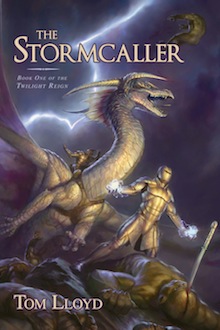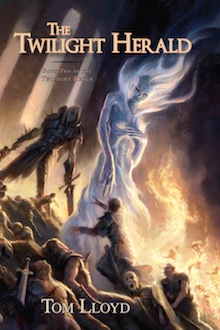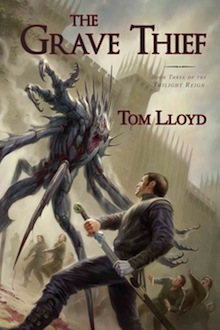It’s a great privilege for me to be the US editor of Tom Lloyd’s impressive The Twilight Reign quintet, a massively epic fantasy series about a young man who is a “White-Eye,” humans blessed (or cursed) by the gods to be bigger, more charismatic, and just plain angrier than normal humans. White-Eyes are destined for leadership roles, with gods-ordained restrictions on their reproduction to prevent them assuming too much power as a class or sub-race inside humanity—they can only reproduce with their own kind, and females are rare. And due to their great size, they invariably kill their mother at their births, leading to some understandably conflicted feelings about and with family.
When The Stormcaller opens, we meet a young wagon brat named Isak, who travels with a band of gypsy-like travelers on the edges of the kingdom of the Farlan. It comes as quite a surprise when a messenger of the gods appears and announces that Isak is to report immediately to the Farlan’s White-Eye ruler, Lord Bahl, to be trained as his heir. It’s an even bigger surprise to Lord Bahl himself, given the long lifespans enjoyed by White-Eyes, who wonders why he needs an heir all of a sudden after several centuries of successful rule without one. From this rocky start, Isak is quickly thrust into a complex world teetering on the brink of war. I am endlessly fascinated by the scope and scale of Lloyd’s imagination, so I thought I would ask him a few questions about his work here.
 Anders: When The Stormcaller first debuted in the UK, the wonderful Cheryl Morgan began her review of it with the line, “There is a sense in which most fantasy novels descend in some way from either Tolkien or Moorcock.” I think I misremembered what she actually said at the time, but I’ve cited her review and cobbled together my own shorthand for a five-second explanation for the world of The Twilight Reign. When speaking about the books, I always start by saying “It’s a Moorcockian antihero set loose in Middle Earth.” I like that because the brooding, charismatic, and volatile lead Isak the White-Eye is very much cut from the cloth of Elric or Corum, but the depth of your world-building is astounding. The Land has a complex history, and it seems your characters can’t pass a stream or a hill or a well that doesn’t have some legend associated with it. Can you talk about these two poles of Tolkien and Moorcock, and how much each did or didn’t influence you as writer.
Anders: When The Stormcaller first debuted in the UK, the wonderful Cheryl Morgan began her review of it with the line, “There is a sense in which most fantasy novels descend in some way from either Tolkien or Moorcock.” I think I misremembered what she actually said at the time, but I’ve cited her review and cobbled together my own shorthand for a five-second explanation for the world of The Twilight Reign. When speaking about the books, I always start by saying “It’s a Moorcockian antihero set loose in Middle Earth.” I like that because the brooding, charismatic, and volatile lead Isak the White-Eye is very much cut from the cloth of Elric or Corum, but the depth of your world-building is astounding. The Land has a complex history, and it seems your characters can’t pass a stream or a hill or a well that doesn’t have some legend associated with it. Can you talk about these two poles of Tolkien and Moorcock, and how much each did or didn’t influence you as writer.
Lloyd: It’s curious just how much the character of Elric spoke to me when I didn’t particularly enjoy the books at the time. I had actually come up with the idea of white-eyes a while before I read my first Moorcock, but I loved the image despite his writing style not working for me. I first read The Hobbit many years before that and Tolkien comprises the core of my fantasy background, as he does for many people. He understood where myth and folklore fitted into life, how they added texture to society and can make a world come alive in the reader’s mind. A lot of people whine about world-building and certainly you don’t want an essay on the subject, but I’ve read a few books where the author clearly hadn’t bothered with understanding their world, and as a result it was a superficial read. Moorcock assured me that you didn’t need a cuddly hero for a book to be good; Tolkien reminded me that you need more than just a hero for a good book.
Anders: I also love how you include traditional fantasy tropes, but not in the way one expects. You’ve got elves, but they aren’t your parents’ elves, are they?
Lloyd: They’re not the beautiful, shining fey-folk most people expect when they hear the term “elf” certainly! I didn’t see the point in writing about those; I wanted the damaged result of a distant golden age instead. They’re twisted and degenerate, shunned by the gods and hardly the magical folk waiting in the wings to provide my hero with the knowledge he needs to defeat the dark lord. It’s funny how the very mention of the word “elf” is enough to put people off a book, no matter what form they come in, but you can either make an effort to run away from traditional tropes or meet them head on and see what happens.
 Anders: Theater plays an important role in the second book, The Twilight Herald. It seems like performance is often overlooked in fantasy settings, and I was elated to see the connections made between performance and magic. Do you have a theatrical background?
Anders: Theater plays an important role in the second book, The Twilight Herald. It seems like performance is often overlooked in fantasy settings, and I was elated to see the connections made between performance and magic. Do you have a theatrical background?
Lloyd: Not at all, I’m afraid! Once I started thinking about plots I realized I didn’t want a bad guy with overwhelming power, but one who uses persuasion to get what he wants. With a strong sense of history and myth in the series I wanted those elements to be incorporated in the plot, and the theater was one of the few forms of mass entertainment in medieval times—if you want to manipulate people that was one of the ways to go about it. If anything I didn’t develop the theme as much as I’d have liked, not wanting to get too caught up in the idea of weaving performance, myth, and magic and end up following the tangent too far. It is an idea worth exploring in a later book when I’ve not got a complicated series plot to stick to, but I might need to develop some more specific playwriting skills first!
Anders: Personally, I’m not big on all-powerful Dark Lords whose armies of full of faceless minions that will follow him unthinkingly (and consequently, you don’t find a lot of that in Pyr’s brand of fantasy). One of the things I like about your Lord Styrax is that I really like Lord Styrax. I think there’s a real way in which you could flip this narrative, and write a story from his perspective in which Isak is the bad guy. I mean, he’s a charismatic, creative, honorable and ambitious guy, and just has the unfortunate circumstance to be across the political divide from the character we’re following.
 Lloyd: Absolutely—something that’s explored further in The Grave Thief, where you see opposing sides using the same dubious tactics and battles from both sides. A large part of the series could come from the Menin perspective certainly, something that I suspect I got from all the Cold War novels I read. Those engaged in the fight only had things in common with their opposite numbers, the world they inhabited bore no relation to the one they were fighting for, they just happened to be on one side of a fight that was greater than any of them.
Lloyd: Absolutely—something that’s explored further in The Grave Thief, where you see opposing sides using the same dubious tactics and battles from both sides. A large part of the series could come from the Menin perspective certainly, something that I suspect I got from all the Cold War novels I read. Those engaged in the fight only had things in common with their opposite numbers, the world they inhabited bore no relation to the one they were fighting for, they just happened to be on one side of a fight that was greater than any of them.
Styrax is one of my favorites too, as is Amber, one of his subordinates. I’d get bored if I didn’t enjoy writing all the scenes and all the characters. From the outset I wanted a (supposedly) Dark Lord who matched up to his reputation, who really was that skilled and deserved to be, rather than be a cartoon character. You either have the choice of making him appear insane and megalomaniacal, or sympathetic—the fact of the matter is that Styrax would be a better ruler than Isak in all likelihood. I’m delighted to see on my forum that even my hardcore fans are completely divided over Styrax. As many like him as hate him!
Anders: One of my favorite aspects of The Twilight Reign is the way in which the gods are active players. Your gods seem to be a cross between Greek gods, with their rivalries and foibles, and Hindu deities, with the way in which minor deities can be subsumed into larger ones, gobbled up and made “aspects” of a macro-god almost like subroutines in a larger program, or individual notes played on the same string of a musical instrument. I’ve never seen anything like it, but it feels “authentic” (and a bit like string theory). Can you talk about how you came up with this?
Lloyd: One book that was a big influence on me was Greg Keyes’ The Waterborn. I loved the fact that from the outset gods were part of everyday life in it, there was a god of the meadow they owned, and a goddess of the stream that he’s sent to meet by his father early on (if memory serves me correctly, it’s been a few years). As an atheist I’d love the idea of real, tangible gods, and I wanted to incorporate that with the quarrelsome greater gods that would affect nations of Greek or Norse myth, along with a lot of the allusions and musings that Terry Pratchett includes in the Discworld series, especially Small Gods.
I decided it would be more fun to have gods grow alongside the mortals of the Land and be part of it, rather than have them a step above the physical world. That means they would be small to start with and there’d be a hundred thunder gods out there, until they came into conflict. I still wanted a goddess of each stream however, so why not consider them pack animals—one achieving dominance rather than killing its rivals. It’s one of several things I hadn’t really planned until I needed to work out the details of the situation, but found myself enjoying the idea the more I played with it!
Anders: Without giving too much away, it’s been a while since I recommended Alice K. Turner’s A History of Hell for you as research for book four, The Ragged Man. Can you talk about what you took from this, and how you went about shaping an afterworld that would feel convincing and three-dimensional (or should that be four-dimensional?), without coming across as simply lifting pages out of a Judeo-Christian underworld?
Lloyd: Well the more you think about the fundamentals of how a world works, the more you find yourself having to sketch out little details such as where characters go when they die, who judges them, how are they punished exactly, how they might find themselves in hell, what mechanism takes them to the afterlife, what prayers for the dead might achieve, etc. etc. These are all things people capable of talking to gods would know—having laid out a complex pantheon of gods and more than a few daemons, the Judeo-Christian picture just wasn’t detailed or satisfying enough to my mind. I don’t think medieval priests were ever amenable to someone saying “sure, I get the idea of purgatory, but exactly what colour is it and how does it work? Where physically does it sit compared to heaven, who controls the entry-exit side of things and what criteria are they working to?”
It’s easy to get bogged down in world-building and to write too much, but having decided I wanted a scene in the afterlife I knew I had to provide a detailed picture of what was on show there—there are a number of recurring threads of course, but I had a basic idea of what I needed. There are gods and daemons, one judging the dead and the others presiding over the damned. Not all sinners should go to hell but if it was an easy ride there’d be no reason to fear sinning, plus I wanted a physical landscape for a mortal to negotiate. After that it was just a question of checking out the different ancient religions and seeing what little details caught my eye.
Anders: I’ve been impressed recently by the number of Pyr fantasy authors who have admitted to being traditional RPG gamers, and to have gained inspiration for their works from gaming. Are you a gamer?
Lloyd: I was once a wargamer certainly; perhaps oddly not in the classic RPG sense (which, I believe requires a fair bit of invention on the player’s part) but tabletop wargames occupied a fair few of my teenage years. There I had a well-realized history of the games to learn as well as a variety of daemons to play with! Considering one of the previous questions it might not come as a surprise that the Chaos army I tended to use was commanded by a champion named Styrax
On the inspiration front, I don’t think it actually directed me all that much, it was more symptomatic of where my tastes lie really. The actual wargaming is more about tactics and bloodthirstiness than creating your own world so the benefits were more in directing my natural inclinations than anything. When something’s produced for mass-consumption like MMORPGs or wargaming, there’s not actually much invention going on there, just as it seems like a real struggle for scriptwriters and directors to be allowed to be too bold when making their movies, because it’s millions rather than thousands their aiming at.
Anders: Periodically, some idiot will come out with the tired pronouncement that genre literature can’t be of quality, yet the scope and scale of The Twilight Reign is jaw-droppingly detailed. What do you think the place—and maybe purpose—of fantasy literature is?
Lloyd: Well, I’m on record as saying I’m principally interested in producing an entertaining story, but let’s face it—as a group, SFF writers are opinionated buggers. The canvas for fantasy tends to be as big as you can get, and when you’re dealing with something like that you’ve got to work with themes worthy of the scale. In The Adamantine Palace you might infer Stephen Deas’ opinions on nuclear weapons, in The Blade Itself you’ll see Joe Abercrombie’s thoughts on heroism and reputation, and in The Twilight Reign there’s the occasional thought on political morality and duty among other things. I don’t think fantasy literature must serve a purpose, but it’s a good vehicle when, as long as it’s written well, nothing looks implausible on the page. That aside, my goal is to paint a picture that makes the reader forget the rest of the world for a short time, to make them miss their stop on the train or turn the light out an hour after they intended. Anything more is a bonus.
(You can visit Tom Lloyd online here, and read an excerpt of The Stormcaller here.)
Lou Anders is the three-time Hugo-nominated editor of Pyr books, as well as the editor of seven critically-acclaimed anthologies, the latest being Fast Forward 2 and Sideways in Crime. He recently won a Chesley Award for Best Art Director, and is pretty chuffed about that too. Visit him online at his blog, Bowing to the Future.









